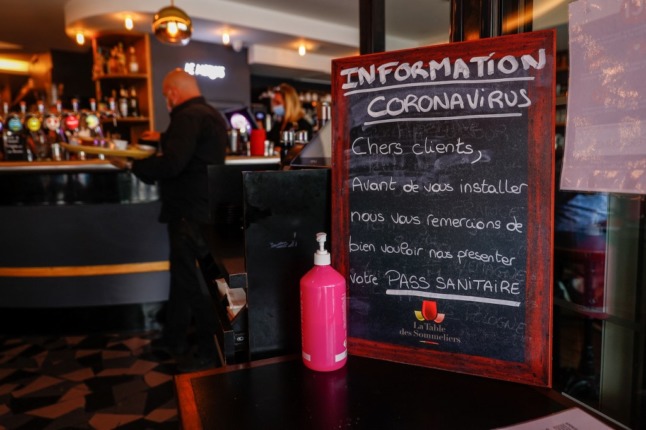Whether the country is facing another major outbreak in the coming months “depends on our actions”, Spahn told a smattering of reporters at a Berlin press briefing on Friday.
“A carefree summer cannot turn into a worrying autumn,” he warned.
The rate of Covid-19 infection has been dropping rapidly in Germany over the past few months.
On Friday, the RKI reported that the 7-day incidence of new infections per 100,000 people had decreased to 6.2, down from 6.6 the day before, and 10.3 the previous week.
Meanwhile, 774 new Covid infections were logged in 24 hours, down from more than a thousand just a week ago. A total of 62 deaths were reported in the same time period.
But at the press conference on Friday afternoon, the German Health Minister and Lothar Wieler, president of the Robert Koch Insitute (RKI), were united in their calls for caution.
The use of the Corona Warn App and the ‘AHA’ acronym – distance, hygiene, and wearing a mask indoors – would continue to be necessary over summer, emphasised Wieler.
While people will likely be free to travel this summer, they should also observe hygiene rules and stay vigilant while abroad, he added.
Health officials in Germany are currently keeping a close eye on the spread of the Delta variant, a highly infectious strain of Covid-19 that was first discovered in India.
READ ALSO: ANALYSIS – Where (and how) are Germany’s Delta variant Covid-19 infections spreading?
The proportion of Delta cases as a share of infections is currently rising steeply across Germany, though the overall number of Delta cases remains steady.
Asked whether Delta was more dangerous than the more dominant Alpha variant of Covid, Wieler said that it was still too early to say for sure. What we do know, he said, is that more people infected with the Delta variant end up in hospital.
‘Do you think we enjoy restricting freedom?’
Fending off his critics, Spahn was keen to point out that the Covid-19 measures put in place by the government were not ideological.
“Does anyone here really think we enjoy restricting people’s freedoms?” Spahn asked the reporters who were assembled in the Bundestag press centre.
Spahn and Wieler also fielded numerous questions about the restrictions placed on school pupils, including the Robert Koch Institute’s recent recommendation that testing and masks continue in schools until next spring.
READ MORE: German health officials – Masks and Covid tests should continue in schools until spring 2022
“How should we interpret the news that, while ‘home office’ rules are coming to an end, Covid measures in schools are set to continue?” asked one reporter.
“Does the Health Minister consider young people to be particularly dangerous in terms of the spread of the pandemic?”
In response, Spahn explained that, while Germany was likely set for a relaxed summer, the country could be in a very different place in autumn and winter, when infection rates are likely to rise.
This could also coincide with the return of children to schools in September – when most German states want to reintroduce in-person teaching at pre-pandemic capacities.
“Parents and children have, I think justifiably, the expectation that after the school holidays, the school term will be much better conceptualised than it was earlier this year,” Spahn said.
Mask-wearing had been shown to be an incredibly effective measure against the spread of the pandemic, Wieler added.
‘Vast majority’ can get vaccine in coming weeks
In response to a question on Germany’s vaccination drive, Spahn appeared relaxed about the availability of appointments.
He pointed out that doctors’ surgeries were generally giving out spare vaccine doses at the end of the day, and that there were numerous other options to get vaccinated, such as at universities or through last-minute appointments at large vaccination centres.
READ ALSO: State by state – How to apply for a Covid vaccine appointment in Germany
In Potsdam, near Berlin, he said he was aware of numerous available appointments over the coming days.
“My impression is that, over the next few weeks, the vast majority of people who want a vaccine will be able to get an appointment,” he said.
So far in Germany’s inoculation campaign, 52.9 percent of the population has received at least one dose of the vaccine, while more than a third (34.1 percent) are now fully vaccinated.
According to German government’s Impfdashboard, almost one million vaccine doses were given out on Thursday.
Pharmacies to receive reduced reimbursement for digital vaccine pass
In mid-June, the German government began the gradual roll-out of its digital vaccine pass, which should offer an easier way for people to prove their vaccination status.
Without a digital pass, anyone who wants to show that they were fully inoculated has to carry their yellow vaccine booklet around with them.
READ ALSO:
- Germany’s digital vaccine pass to be rolled out ‘step by step’ from Thursday
- How I got Germany’s new digital CovPass with my US vaccination certificate
Earlier this month Spahn said he planned to reduce the amount of money that pharmacies receive for giving out the pass from July.
Though the digital pass is issued to customers free-of-charge, pharmacies currently receive €18 from the government for each certificate they issue.
“From the start of July – I can’t put an exact date on it – the pharmacies will get €6 per certificate, which I think people can deal with,” he said.



 Please whitelist us to continue reading.
Please whitelist us to continue reading.
Member comments